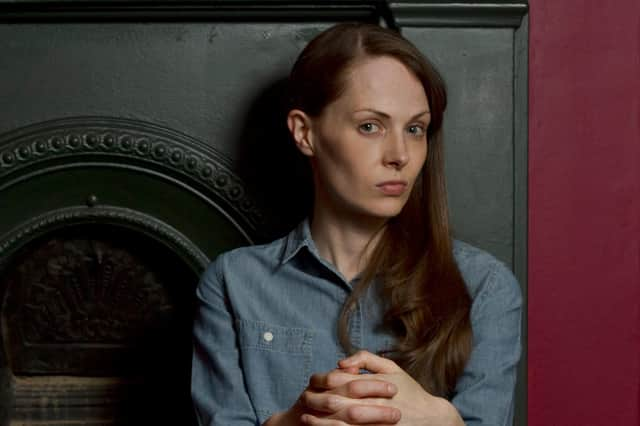Book review: My Phantoms, by Gwendoline Riley


To deploy a fashionable suffix, it is always clear when you are in the Rileyverse. As with her six previous novels, My Phantoms has a first person female narrator; in this case, Bridget Grant. Bridget has a similar voice, being both forensically distant and (if this is not too much of an oxymoron) furiously affectless. She is self-sufficient and brittle, not without solipsism and with a capacity to become remote. One of the joys of Riley’s work is that though it is possible to trace common themes and a certain cut of the jib, the novels are markedly different. As with prior books, this is a novel of squirmy, excruciating humour but also poignancy and pathos. The writing is as crisp and clever as always, and Riley’s ear for how people speak, and how to render that in the artifice of the novel, has never been deployed more successfully.
Bridget lives in London with her partner. She does not go to her father’s funeral, having not seen the uncharming chancer for years. She is slightly estranged from her younger sister. She has intermittent and dysfunctional contact with her mother, Helen, who is always known as Hen. Hen has had a disappointing life but in Bridget’s narration she becomes, ironically, the star of her own show. The novel swirls in time, taking “Bridge” from childhood to her forties, and evokes each period with just the right, sly detail.
Advertisement
Hide AdHen is, as Hen might say, a thing and a half. Her daughter describes her as “mulish, when she wasn’t completely biddable, and each mode always at precisely the wrong time.” Riley is a laureate of the stilted, and the dialogue crackles with repetitions, unsaid ellipses, contradictions. Answering one question she replies “Oh yes, I hated it, yes,” where the enthusiastic agreement of the first yes sinks into a resigned echo. Being asked about an order for lunch in an old haunt, she says “Yes. No. Not yet.” About whom she saw in the restaurant bar in the 60s, she “Oh”… “Yes. I don’t know. Various people. Um? Who did I see?” Hen uses italics to sad and hilarious effect: “It just so happened”, “So – a few weeks later, picture the scene”, or – heart-rending – “Mmm. Well. So you know, I did stay sort of standing in his group, and the crowd thinned out, and no one has asked me anything or spoken to me, or even acknowledged my existence really, they were all just discussing something they were doing at the weekend, so finally I just said ‘Well, I’m going now. Time to hit the road!’” She has a nice line in second hand quotes, saying “hold the mustard” sarcastically, or “Life’s not fair? Life’s not fair, is it?” or imitating Magnus Magnusson mid-anecdote.


We only experience Hen through Bridge’s recounting, and this allows for an important layering of perspectives. It would have been too easy by far to have Hen as a sit-com central casting ghastly mother – and she is infuriating, gauche and prone to fads (a very funny section involves all the “interests” she either takes up and drops, or takes up and doesn’t really like). But this cool, reserved daughter might have motives of her own to paint her mother in such a bad light; she was, after all, subjected to her father’s pitiless and snide mockery which masqueraded as bantz, so has learned certain lessons of non-engagement. It also allows for a chink of the reader’s slowly constructed view of a lonely person, one who, as her daughter fully understands, only likes to answer questions if she knows the socially acceptable response to the query. There are subterranean hints of another story not being told; little rhymes of behaviour and blurts which never develop into a fuller “tell-all” scene. What makes this literature is that there is that plurality of interpretation. Nothing is uncomplicated. Nothing is stereotype, even when people behave stereotypically. There are points where I laughed uproariously, and at one and the same time thought “you shouldn’t be laughing at this.”
The title is curious: My Phantoms. At the end of the book, the reader ought to ask “Whose phantoms?” The simplest answer is to cast Bridge’s family as the spectres; Bridge who we witness is no expert at building them. The will-o’-the-wisps might be Hen’s enthusiasms and delusions, and the ending – which cannot be revealed – gives some credence to the idea that she is the haunted one. Or is it the author herself, tasked with humanising these people who don’t actually exist?
There is a great deal of psychological perceptiveness in this slim novel, and in contrast to some of Riley’s other novels, there is a melancholy redemption about it. Riley has written of slight and snatched happiness before, but rarely the kind of vexatious possibility of relationships being righted. One of the cadenzas here is “Hate hate hate. But my mother didn’t hate. It was just a word she used. It was just her announcing-ness. She thought it sounded vital and dashing. She thought it set her apart.” That seems like a plausible summary of the novel itself, and it does set itself apart, and is vital, and dashing.
My Phantoms, by Gwendoline Riley, Granta, £12.99
A message from the Editor
Thank you for reading this article. We're more reliant on your support than ever as the shift in consumer habits brought about by coronavirus impacts our advertisers.
If you haven't already, please consider supporting our trusted, fact-checked journalism by taking out a digital subscription at https://www.scotsman.com/subscriptions